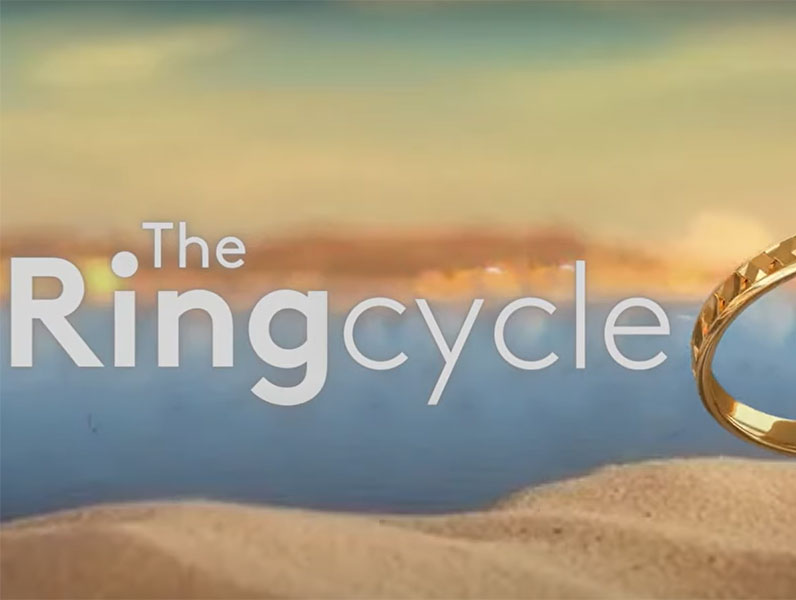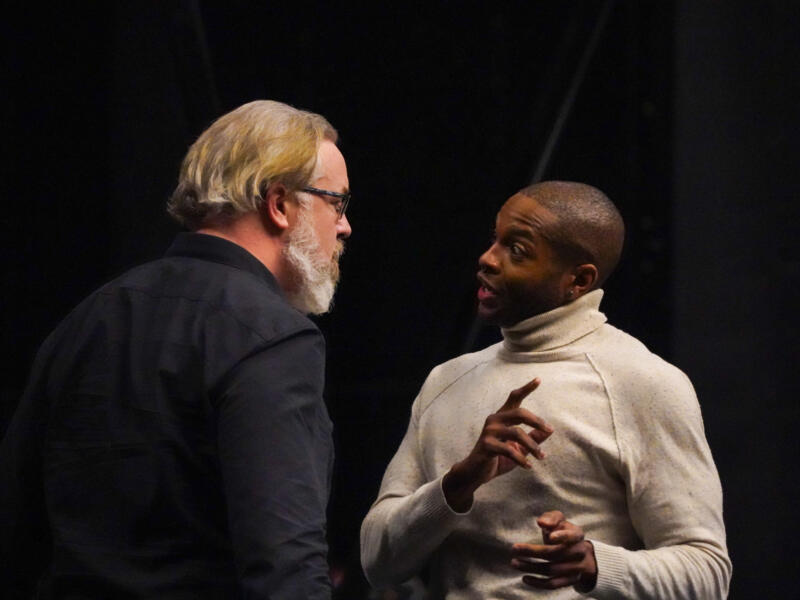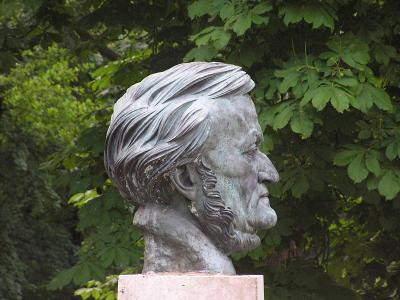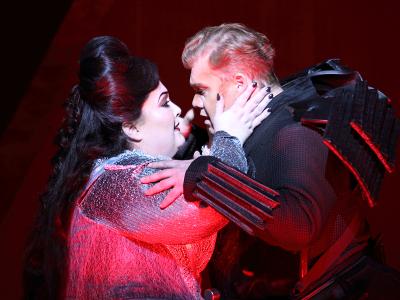Discover The Rhinegold
Giants, dwarfs, nymphs and deities quarrel and clash in the first part of Wagner‘s epic Ring Cycle.
Wagner’s music uses rich harmonies and complex vocal and instrumental textures in which the orchestral writing plays a full part in the sound-world.
Book now to see The Rhinegold, the first part of the Ring cycle.
Synopsis
The branches of the World Ash Tree hold the world together.
The world is comprised of the Upper Realms, where the gods live; Riesenheim, where the giants live; the Rhine, where the Rhine-daughters live; and the subterranean realm inhabited by the Nibelungs.
The god Wotan has drunk from a spring beneath the World Ash Tree – and has gained wisdom. In payment he has sacrificed an eye. He has torn a branch from the tree, carved a spear from the branch, and through it he rules the world.
Scene 1
The three Rhine-daughters – Woglinde, Wellgunde and Flosshilde – are playing in the depths of the riverbed, guarding the Rhinegold.
Alberich, a Nibelung, watches them and desires them. Each daughter encourages him – then rejects him. Sunlight falls on the gold. Alberich asks about the treasure.
The Rhine-daughters tell him that if the gold were to be forged into a ring it would give its owner infinite power over the world – but intimacy and love must be cursed and renounced. Alberich makes the curse and seizes the Rhinegold.
Scene 2
Wotan and his wife Fricka, the goddess of marriage, are asleep. Fricka, waking first, sees the fortress newly built for the gods by the giants Fasolt and Fafner.
Wotan is overjoyed at the sight of the building. Fricka reminds him that as payment he has promised to give the giants her sister Freia, the goddess of love. Wotan evades Fricka by reminding her that she too wished for the fortress. Fricka reproaches Wotan for trading the goddess of love for a powerful fortress. He replies that he has never had any intention of letting Freia go – he awaits Loge (the god of fire) and is sure that Loge’s diplomacy will sort out the problem.
The giants Fafner and Fasolt arrive.
Wotan tells them to choose an alternative payment. Fasolt indicates the laws and contract written on Wotan’s spear and reminds him that the contract for the building is binding.
While Fasolt wishes for a wife, Fafner reminds his brother that Freia provides the gods with golden apples, which give them eternal youth – without her they will decline and die.
Loge fails to arrive. Freia’s brothers – Froh (poetry) and Donner (force) – attempt to intervene. Wotan stops Donner’s use of force.
Loge appears. Wotan complains that he would never have bartered Freia had not Loge agreed to finding a means of saving her. Loge tells the gods and the giants that he has travelled the world seeking an acceptable substitute for Freia and has learnt that nothing is of greater value in the world than a woman’s love. He has found only one person who has been willing to sacrifice love – Alberich – and that the Rhine-daughters are earnestly seeking Wotan’s help in retrieving the gold.
The giants ask about the power of the gold and Loge explains that Alberich has cursed love and forged a ring that gives him absolute power. All become greedy for the gold and the giants say they will exchange Freia for it.
The giants take Freia as ransom. Deprived of Freia’s youth-giving apples, the gods rapidly age. It is for Wotan and Loge to retrieve the gold and they leave for Nibelheim.
Scene 3
Alberich torments his brother Mime, who has made a magic helmet – the Tarnhelm – which can transform its wearer into any shape he wishes. Alberich demonstrates its powers. He leaves as Wotan and Loge arrive.
Mime recounts how the Nibelungs, once contented craftsmen, are enslaved by Alberich.
Alberich returns, brandishing his ring and driving his terrified slaves back. Loge reminds him of their former friendship, but Alberich scornfully dismisses him and boasts of the fabulous power of the ring – he gained it by renouncing love and will use it to overthrow the gods.
Loge challenges Alberich to demonstrate the Tarnhelm’s magic. Alberich turns himself into a dragon, and Loge and Wotan pretend to be frightened. When Loge asks if he can become very small, Alberich transforms himself into a toad. Wotan and Loge pounce on the toad, grab the Tarnhelm and drag him out of Nibelheim.
Scene 4
Loge and Wotan mock Alberich and tell him that the cost of his freedom is his gold. Alberich plans to keep the ring, knowing it will enable him to create more treasure. He orders the Nibelungs to bring his ransom and demands his freedom and the Tarnhelm. Loge claims the helmet.
Wotan now insists Alberich give him the ring too. Alberich protests that the ring is more important than his life. When Wotan reminds him that he acquired the ring through theft, Alberich accuses him of hypocrisy. Alberich’s sin was against himself alone: Wotan’s will be against all existence if he takes the ring. Wotan tears it away from Alberich, who puts a curse on it: it will bring anguish and death to those who possess it, while everyone else will be consumed by envy.
Freia returns with the giants, restoring the gods’ strength. Fasolt does not want to give Freia back, and orders that the gold be piled up to hide her from his sight. Loge and Froh heap it up but Fafner claims he can still see Freia’s hair. The Tarnhelm must be added to the pile. Fasolt cries that he can still see her eye, so Fafner demands that the ring on Wotan’s finger be used to stop the gap. Loge says Wotan intends to return it to the Rhine-daughters. Wotan insists on keeping it.
The giants are about to leave with Freia when Erda, the earth goddess, appears. She reminds Wotan of the curse on the ring and says a dark day is dawning for the gods. He must surrender the ring.
Erda disappears and Wotan agrees to hand over the ring. Freia is freed. Fafner and Fasolt argue about the division of the treasure. When Fasolt seizes the ring, Fafner kills him. Wotan is horrified at the power of the ring’s curse.
Donner summons a storm to clear the air. A rainbow bridge leads the gods to their new fortress, which Wotan names Valhalla (hall of the slain). As the gods make their way towards it, Loge reflects that they are moving towards their destruction. Wotan dismisses the Rhine-daughters’ lament for their lost gold. but Alberich scornfully dismisses him.
How long is The Rhinegold?
A performance of The Rhinegold at the ENO’s London Coliseum is roughly 2hrs 45mins without an interval. To experience the start of Wagner’s epic saga, book your tickets to see The Rhinegold in 2023.
Who wrote The Rhinegold?
The Rhinegold was written by German composer, Richard Wagner (1813-1883) as part of his epic 4 part saga Ring Cycle inspired by Norse mythology.
When was The Rhinegold written?
Composed over 26 years and lasting over 16 hours in total, this marathon opera was first performed at the inaugural Bayreuth Festival in 1876 in celebration of his output.
What is The Rhinegold about?
Following the journey of a magical gold ring, this is a dramatic story of power and greed. The dwarf Alberich steals some gold and forges a ring from the river Rhine. The leader of the gods Wotan is desperate to find the ring to pay his debts but an epic battle ensues leaving the fate of the nine worlds in the balance. Will his power-hungry plans prove his ultimate downfall?
Where is The Rhinegold set?
The Rhinegold is set in the rich and fantastical world of Norse mythology around the fortress Valhalla.





